Hello, readers! Today, I want to discuss the various uses and benefits of aloe vera. This plant has been recognized for centuries for its incredible medicinal properties, making it a go-to ingredient in skincare, haircare, and digestive health products. Let’s dive deeper into the numerous advantages of incorporating aloe vera into your daily routine.
Key Takeaways:
- Aloe vera gel contains essential vitamins, minerals, amino acids, and antioxidants that contribute to its effectiveness in promoting overall health.
- Topical application of aloe vera gel can provide relief for a variety of skin conditions, including burns, acne, and inflammation.
- Aloe vera gel nourishes the scalp, promotes hair growth, and helps manage dandruff, resulting in healthy and lustrous hair.
- Although aloe vera latex may have laxative effects, caution should be exercised, and medical guidance sought before oral consumption.
- Aloe vera has demonstrated potential benefits for oral health, including reducing dental plaque, treating gingivitis, and promoting the healing of mouth ulcers.
Aloe Vera for Skin
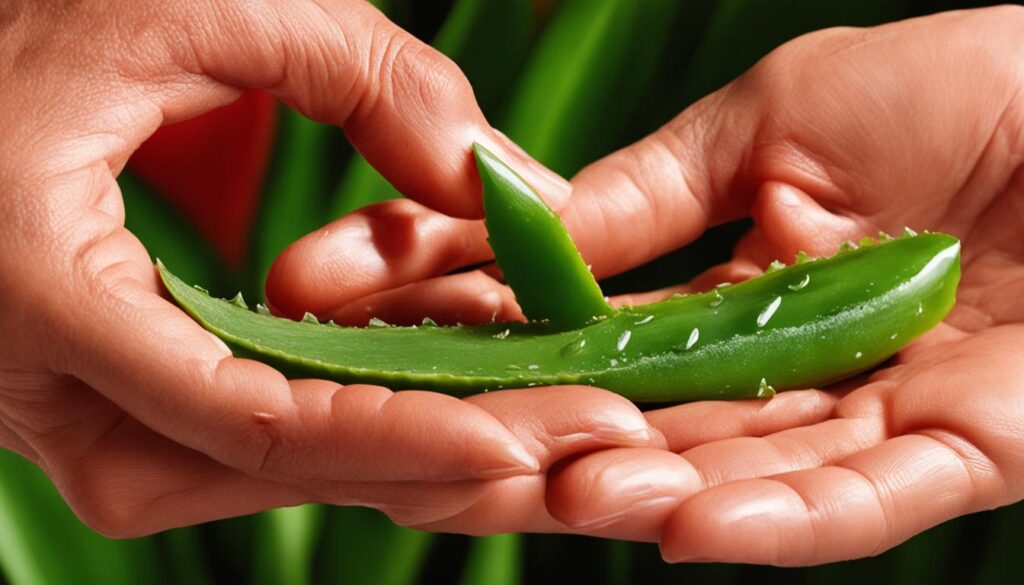
Aloe vera gel is widely recognized for its remarkable benefits in skincare. Its soothing and moisturizing properties make it a popular choice for treating various skin conditions.
- Relieves Burns: Studies have shown that aloe vera gel can effectively heal first and second-degree burns by accelerating the healing process and preventing infections. Its cooling sensation provides immediate relief from pain and discomfort.
- Treats Acne: Aloe vera’s natural antibacterial properties help combat acne and reduce inflammation. Its soothing effects alleviate redness, itching, and swelling, promoting clearer and healthier-looking skin.

Whether you’re dealing with burns or acne, applying aloe vera gel topically can significantly improve the condition of your skin. It provides hydration, reduces redness and irritation, and boosts the overall health and appearance of your skin.
Aloe Vera for Hair
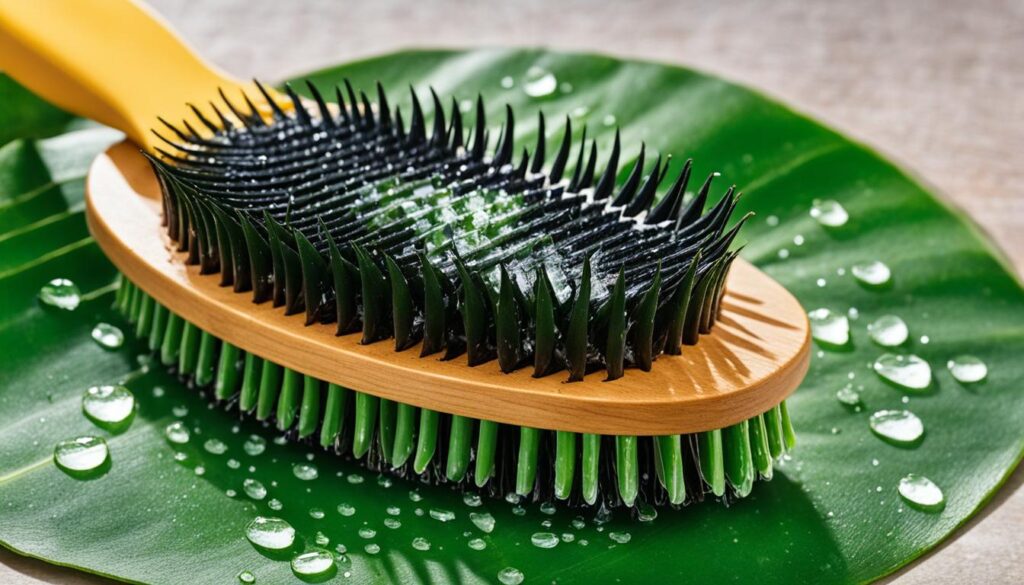
Aloe vera gel is not just beneficial for your skin, but it can also work wonders for your hair. Incorporating aloe vera gel into your hair care routine can help nourish your scalp, promote hair growth, and improve the overall condition of your hair.
Studies have shown that aloe vera gel can reduce itchiness, scaliness, and the size of affected areas in conditions like seborrheic dermatitis, which can cause temporary hair loss. By soothing the scalp and reducing inflammation, aloe vera gel helps create a healthier environment for hair growth.
Additionally, aloe vera gel can be effective in combating dandruff. Its moisturizing properties hydrate the scalp, reducing dryness and flakiness. Aloe vera’s soothing nature can also help alleviate itchiness, a common symptom of dandruff.
How to Use Aloe Vera Gel for Hair
To harness the benefits of aloe vera for your hair, follow these simple steps:
- Start by obtaining freshly extracted aloe vera gel. You can either extract it from an aloe vera leaf or use commercial aloe vera gel products that are specifically formulated for hair care.
- Apply the aloe vera gel directly to your scalp and massage gently. Make sure to cover the entire scalp.
- Leave the gel on your scalp for about 30 minutes to an hour to allow it to penetrate the scalp and hair follicles.
- Rinse your hair thoroughly to remove the gel. Follow up with your regular shampoo and conditioner.
Repeat this process once or twice a week to reap the benefits of aloe vera for your hair and scalp.
Aloe vera gel can also be combined with other natural ingredients, such as coconut oil or essential oils, to create DIY hair masks or treatments tailored to your specific hair needs.
Aloe Vera for Hair: Before and After
Still not convinced about the benefits of aloe vera for your hair? Take a look at this before and after comparison:
| Before | After |
|---|---|
As you can see, regular use of aloe vera gel has resulted in healthier, shinier, and more lustrous hair.
So, why not give aloe vera a try? Incorporating this natural ingredient into your hair care routine can help you achieve the strong, beautiful hair you’ve always desired.
Aloe Vera for Digestion
Aloe vera is known for its wide range of health benefits, including its potential effects on digestion. While aloe vera latex, found just under the skin of the leaf, has been traditionally used as a natural remedy for constipation due to its laxative effects, it’s important to exercise caution and seek medical guidance before using it in frequent or high doses. Aloe Vera for constipation has been a popular remedy, but it’s essential to prioritize safety and consult with a healthcare professional.
Additionally, aloe vera has been touted for its potential to alleviate symptoms of irritable bowel syndrome (IBS) and inflammatory bowel disease (IBD). However, more research is needed to establish its efficacy for these conditions. While aloe vera in various forms, such as juice or supplements, may have potential digestive benefits, it’s crucial to exercise caution and seek professional advice before incorporating it into your routine.
| Aloe Vera for Digestion | Benefits and Considerations |
|---|---|
| Aloe Vera for constipation | – Contains laxative effects – Traditionally used as a natural remedy – Caution required for frequent or high doses |
| Potential for IBS and IBD | – Requires further research to establish efficacy – Exercise caution and seek professional advice |
| Various Forms of Aloe Vera | – Juice or supplements may have potential digestive benefits – Consult with a healthcare professional before use |
While aloe vera shows promise for improving digestion, it is crucial to prioritize safety and consult with a healthcare professional before using aloe vera products or supplements orally. By seeking guidance and staying informed, you can ensure that you make informed choices regarding your digestive health.
Aloe Vera for Oral Health
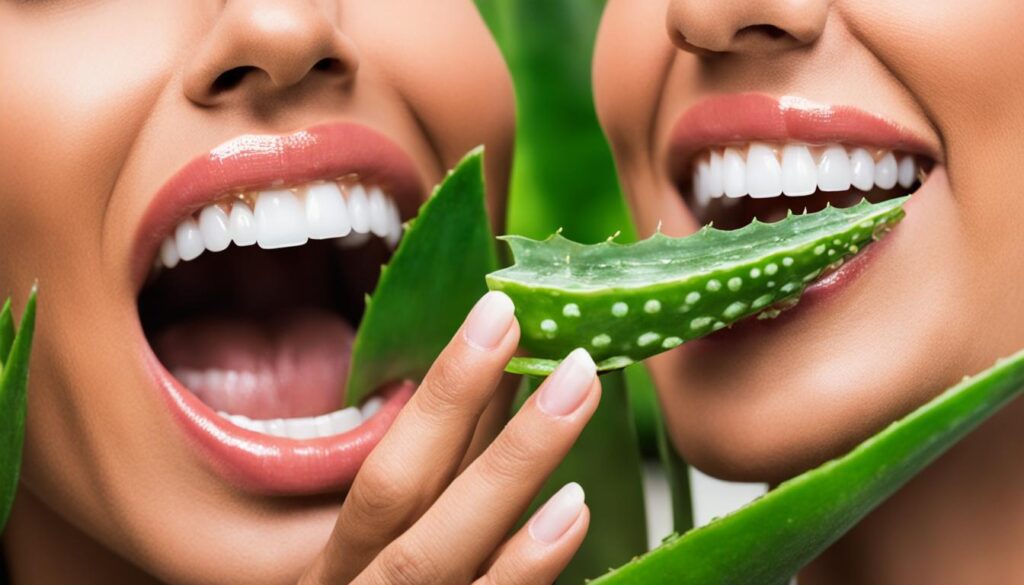
Aloe vera has been proven to have numerous benefits for oral health. Research studies have shown that it is effective in reducing dental plaque and gingivitis, comparable to the commonly used mouthwash ingredient, chlorhexidine. In fact, aloe vera mouthwash has been found to decrease plaque, gingivitis, and the presence of plaque-producing bacteria in the mouth.
Aloe vera also possesses antifungal properties, which make it a valuable tool in the treatment of Candida albicans, a yeast infection that can affect the mouth. Additionally, aloe vera gel can be an effective treatment for mouth ulcers, significantly accelerating their healing process while reducing associated pain.
The use of aloe vera in oral care is a natural and holistic approach that can provide relief from common oral health problems. Its antibacterial, anti-inflammatory, and soothing properties make it an excellent choice for maintaining a healthy mouth.
It is important to note that while aloe vera offers these oral health benefits, it is not a substitute for regular dental hygiene practices such as brushing, flossing, and routine dental check-ups. Aloe vera can be incorporated into your oral care routine as a complementary treatment to promote optimal oral health.
Aloe Vera’s Effects on Aging
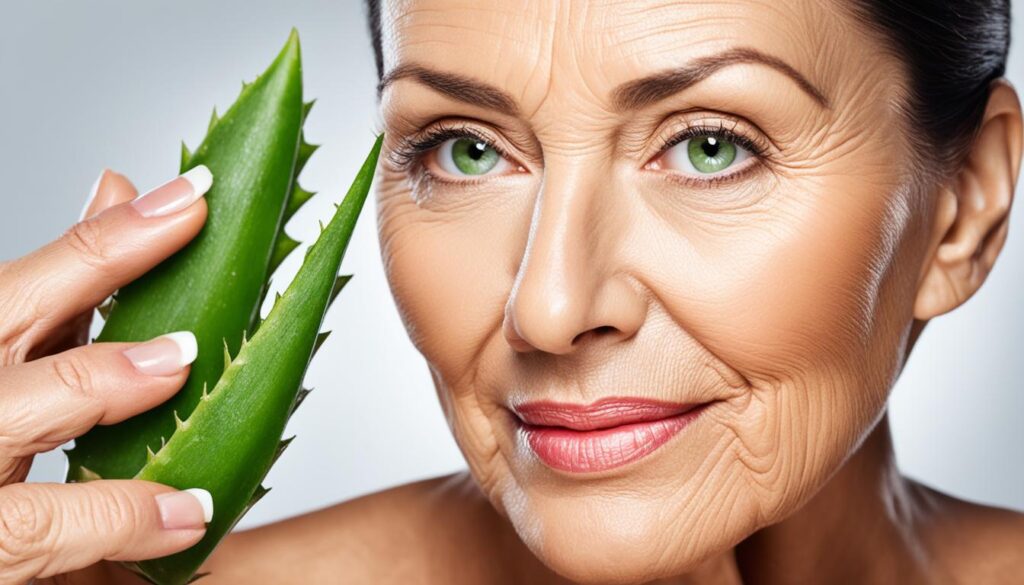
Aloe vera has gained recognition for its potential anti-aging benefits, offering a natural approach to maintaining youthful and radiant skin. Studies have revealed its effectiveness in addressing common signs of aging, such as wrinkles and loss of skin elasticity.
Research suggests that oral consumption of aloe vera gel can stimulate collagen production, a key protein that provides structure and firmness to the skin. Increased collagen production can help reduce the appearance of wrinkles and fine lines, promoting a smoother and more youthful complexion.
Furthermore, aloe vera has been found to improve skin elasticity, allowing the skin to retain its natural suppleness and bounce. This can help combat the sagging or drooping that can occur with age.
Aloe vera’s moisturizing properties are also beneficial for aging skin. Proper hydration is essential for maintaining skin health and preventing dryness, which can contribute to the formation of wrinkles. Aloe vera helps the skin retain moisture, improving overall hydration and enhancing the skin’s natural protective barrier.
“Aloe vera gel has shown encouraging results when used in skincare routines for promoting healthier and more youthful skin.”
Incorporating aloe vera into your skincare routine can provide long-lasting benefits. It is important to note that while aloe vera has shown promising results, further research is needed to fully understand its mechanisms and optimal usage.
| Benefits of Aloe Vera for Aging Skin |
|---|
| Reduces the appearance of wrinkles and fine lines |
| Improves skin elasticity and firmness |
| Provides hydration and prevents dryness |
| Enhances the skin’s natural protective barrier |
Integrating aloe vera into your skincare routine is straightforward. You can opt for skincare products containing aloe vera as a primary ingredient, such as moisturizers or serums. Alternatively, you can extract the gel directly from the aloe vera plant and apply it topically to the skin.
Remember to perform a patch test before using aloe vera or any new skincare product to ensure you don’t have any adverse reactions. If you experience any discomfort or irritation, discontinue use and consult a dermatologist.
With regular use, aloe vera can contribute to improved skin health, reduced signs of aging, and a rejuvenated appearance.
Applying Aloe Vera Safely
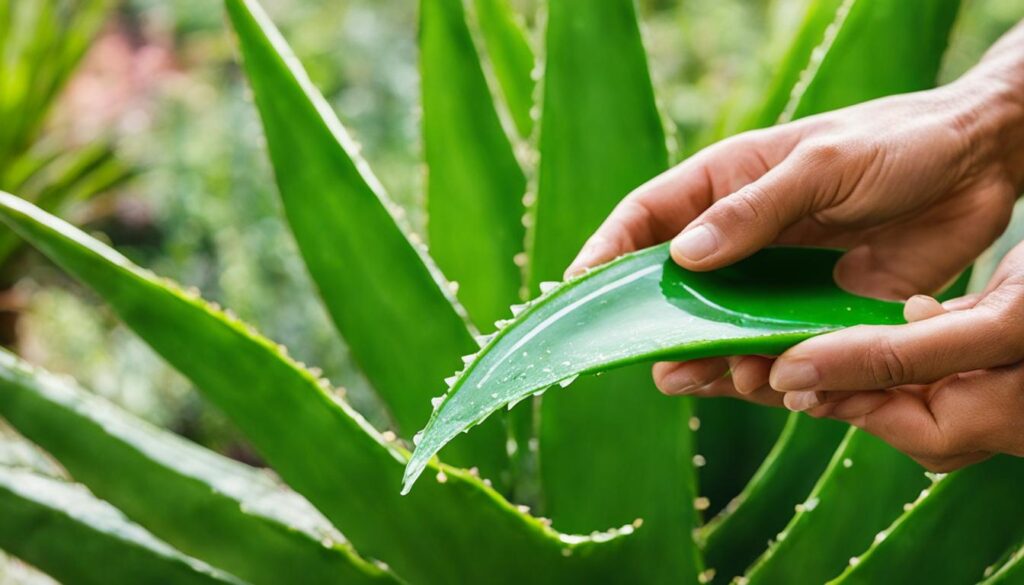
When it comes to using aloe vera, safety should always be a top priority. While aloe vera is generally safe for topical use, it is important to exercise caution when using it orally. The laxative effects of aloe vera may lead to stomach cramps, diarrhea, or electrolyte imbalances, so it is best to avoid consuming it orally without proper guidance.
Moreover, consuming nondecolorized whole leaf extract of aloe vera may pose certain risks. Animal studies have associated it with an increased risk of cancer, highlighting the importance of opting for quality products and consulting a healthcare professional before incorporating aloe vera into your routine, especially if you have pre-existing health conditions.
Tip: Always consult a healthcare professional before using aloe vera or any supplements if you are unsure about their safety or potential interactions with medications.
While aloe vera is generally safe for topical application, certain precautions should be taken. Avoid using aloe vera on deep cuts or severe burns, as it may not be suitable for these conditions. Additionally, individuals with allergies to plants such as garlic, onions, or tulips may be more prone to allergic reactions from aloe vera.
Overall, by using aloe vera safely and following proper guidelines, you can enjoy the benefits of this natural remedy for various skin, hair, and oral health concerns.
| Safety Tips for Using Aloe Vera |
|---|
| Consult a healthcare professional before using aloe vera orally |
| Avoid consuming nondecolorized whole leaf extract of aloe vera |
| Avoid topical application on deep cuts or severe burns |
| Individuals with allergies to garlic, onions, or tulips should be cautious |
Remember, aloe vera is a valuable natural remedy, but it is essential to use it safely and responsibly to ensure the best possible results for your health and well-being.
Selecting and Using Aloe Vera Products
When it comes to choosing aloe vera products, it’s essential to prioritize quality and select reputable brands. By opting for products that contain pure aloe vera gel or decolorized whole leaf extract, you can minimize any potential risks and ensure you’re getting the best possible benefits.
Aloe vera can be used in various forms, allowing you to incorporate it into your daily routine based on your preferences and needs. Here’s a breakdown of how you can use aloe vera:
- Topical use: Apply aloe vera gel or ointment directly to your skin, hair, or affected areas to experience its soothing and moisturizing effects.
- Oral consumption: Incorporate aloe vera juice into smoothies, cocktails, or other beverages to enjoy its potential health benefits.
- Raw form: Some individuals opt to use fresh aloe vera gel directly from the plant itself. However, it’s important to familiarize yourself with proper extraction techniques to ensure safety and effectiveness.
It’s crucial to read and follow the product instructions carefully to achieve desired results and avoid any potential complications. If you have any concerns or questions about the usage or dosage of aloe vera products, it’s always wise to consult healthcare professionals for guidance tailored to your specific needs.
Note: While aloe vera is generally safe for topical use, it’s essential to exercise caution and consider a few important factors:
- Skin sensitivity: Some individuals may experience skin irritation when using aloe vera topically. It’s advisable to perform a patch test on a small area of skin before applying it extensively.
- Deep cuts or severe burns: Aloe vera should not be applied to deep cuts or severe burns. Instead, seek medical attention for appropriate treatment.
- Allergies: Individuals with known allergies to plants such as garlic, onions, or tulips may have an increased risk of allergic reactions to aloe vera. If you have any allergies, it’s best to exercise caution and seek professional advice.
- Medication interactions: Aloe vera supplements may interact with certain medications. If you’re taking medications regularly, it’s crucial to consult healthcare professionals before incorporating aloe vera into your routine.
By following these guidelines and considering these cautions, you can make informed decisions about selecting and using aloe vera products while prioritizing your health and safety.
Cautions and Considerations
While aloe vera is generally safe for topical use, it is important to be aware of certain cautions and considerations.
Topical application of aloe vera may cause skin irritation in some individuals. It is recommended to perform a patch test before using aloe vera products on larger areas of the skin.
Oral consumption of aloe vera, particularly in high doses, can lead to gastrointestinal discomfort such as stomach cramps, diarrhea, or electrolyte imbalances. It is advisable to follow the recommended dosage and consult a healthcare professional before using aloe vera supplements, especially if you have any pre-existing medical conditions or are taking medications regularly.
It is important to note that aloe vera should not be applied to deep cuts, open wounds, or severe burns, as it may delay the healing process. In these cases, medical assistance should be sought.
Individuals with known allergies to plants such as garlic, onions, or tulips may have a higher risk of experiencing allergic reactions to aloe vera. If you have any known allergies, it is recommended to consult a healthcare professional before using aloe vera products.
Furthermore, aloe vera has the potential to interact with certain medications, including but not limited to anticoagulants, diabetes medications, and diuretics. It is crucial to inform your healthcare provider about your use of aloe vera supplements to avoid any potential adverse interactions.
Lastly, it is important to exercise caution when considering aloe vera supplements for children, pregnant women, or breastfeeding mothers. The safety of aloe vera in these populations has not been well-established, and there is a lack of sufficient evidence regarding its potential risks or benefits. It is advisable to consult healthcare professionals before using aloe vera products or supplements in these cases.
FAQ
What are the uses and benefits of Aloe Vera?
Aloe Vera has numerous uses and benefits. It is widely used in skincare, haircare, and digestive health products. It has antioxidant and antibacterial properties, making it a valuable ingredient in various products. Aloe Vera gel contains vitamins, minerals, amino acids, and antioxidants, providing nourishment and promoting overall health and well-being.
How can Aloe Vera benefit the skin?
Aloe Vera is beneficial for the skin due to its soothing and moisturizing properties. It can help treat various skin conditions, including burns and acne. It has been found to reduce healing time, prevent infections, and alleviate redness, itching, and inflammation associated with different skin ailments.
Is Aloe Vera beneficial for hair?
Yes, Aloe Vera is beneficial for hair health. It can nourish the scalp, promote hair growth, and improve the condition of the hair. It has been found to reduce itchiness, scaliness, and areas affected by conditions like seborrheic dermatitis, which can cause temporary hair loss. It may also help combat dandruff by moisturizing the scalp and soothing itchiness.
Can Aloe Vera help with digestion?
Aloe Vera has been traditionally used as a natural remedy for constipation due to its laxative effects. However, frequent and high doses of Aloe Vera latex may have potential safety concerns. While Aloe Vera has been touted for its potential to alleviate symptoms of irritable bowel syndrome (IBS) and inflammatory bowel disease (IBD), more research is needed to establish its efficacy for these conditions.
How does Aloe Vera benefit oral health?
Aloe Vera has been found to reduce dental plaque and gingivitis, comparable to chlorhexidine, a common mouthwash ingredient. Aloe Vera mouthwash can decrease plaque, gingivitis, and the presence of plaque-producing bacteria in the mouth. It has also been shown to have antifungal properties and can help in the treatment of yeast infections in the mouth. Aloe Vera gel can accelerate the healing of mouth ulcers and reduce associated pain.
Does Aloe Vera have any effects on aging?
Yes, Aloe Vera has shown promise in its potential to slow down the aging process of the skin. It can increase collagen production, improve skin elasticity, and promote a more youthful appearance. It also helps the skin retain moisture and improve overall skin integrity, benefiting individuals with dry skin conditions.
How should one apply Aloe Vera safely?
Aloe Vera is generally safe for topical use. It should not be applied to deep cuts or severe burns. Individuals with allergies to plants like garlic, onions, or tulips may have a higher risk of allergic reactions to Aloe Vera. It is important to consult healthcare professionals before using Aloe Vera supplements if medications are taken regularly.
How should I select and use Aloe Vera products?
When selecting Aloe Vera products, choose reputable brands that prioritize quality. Look for products that contain pure Aloe Vera gel or decolorized whole leaf extract. Aloe Vera gel can be applied topically, while Aloe Vera juice can be consumed or used in various beverages. Follow the product instructions and consult healthcare professionals when unsure about usage or dosage.
Are there any cautions or considerations when using Aloe Vera?
While Aloe Vera is generally safe, there are certain cautions to be aware of. Topical Aloe Vera may cause skin irritation, and oral consumption can lead to stomach cramps, diarrhea, or electrolyte imbalances. Aloe Vera may interact with certain medications, so it is important to consult healthcare professionals before using Aloe Vera supplements if medications are taken regularly. Aloe Vera supplements are not recommended for children, pregnant women, or breastfeeding mothers.






